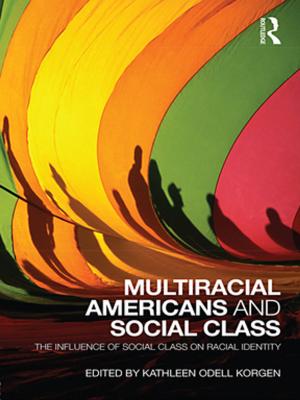Images of Savages
Ancient Roots of Modern Prejudice in Western Culture
Nonfiction, Health & Well Being, Psychology| Author: | Gustav Jahoda | ISBN: | 9781317724902 |
| Publisher: | Taylor and Francis | Publication: | October 3, 2018 |
| Imprint: | Routledge | Language: | English |
| Author: | Gustav Jahoda |
| ISBN: | 9781317724902 |
| Publisher: | Taylor and Francis |
| Publication: | October 3, 2018 |
| Imprint: | Routledge |
| Language: | English |
In Images of Savages, the distinguished psychologist Gustav Jahoda advances the provocative thesis that racism and the perpetual alienation of a racialized 'other' are a central leagacy of the Western tradition. Finding the roots of these demonizations deep in the myth and traditions of classical antiquity, he examines how the monstrous humanoid creatures of ancient myth and the fabulous "wild men" of the medieval European woods shaped early modern explorers' interpretations of the New World they encountered. Drawing on a global scale the schematic of the Western imagination of its "others," Jahoda locates the persistent identification of the racialized other with cannibalism, sexual abandon and animal drives. Turning to Europe's scientific tradition, Jahoda traces this imagery through the work of 18th century scientists on the relationship between humans and apes, the new racist biology of the 19th century studies of "savagery" as an arrested evolutionary state, and the assignment, especially of blacks, to a status intermediate between humans and animals, or that of children in need of paternal protection from Western masters. Finding in these traditional tropes a central influence upon the most current psychological theory, Jahoda presents a startling historical continuity of racial figuration that persists right up to the present day. Far from suggesting a program for the eradication of racial stereotypes, this remarkable effort nevertheless isolates the most significant barriers to equality buried deep within the Western tradition, and proposes a potentially redemptive self-awareness that will contribute to the gradual dismantling of racial injustice and alienation. Gustav Jahoda demonstrates how deeply rooted Western perceptions going back more than a thousand years are still feeding racial prejudice today.
This highly original socio-historical contextualisation will be invaluable to scholars of psychology, sociology and anthropology, and to all those interested in the sources of racial prejudice.
In Images of Savages, the distinguished psychologist Gustav Jahoda advances the provocative thesis that racism and the perpetual alienation of a racialized 'other' are a central leagacy of the Western tradition. Finding the roots of these demonizations deep in the myth and traditions of classical antiquity, he examines how the monstrous humanoid creatures of ancient myth and the fabulous "wild men" of the medieval European woods shaped early modern explorers' interpretations of the New World they encountered. Drawing on a global scale the schematic of the Western imagination of its "others," Jahoda locates the persistent identification of the racialized other with cannibalism, sexual abandon and animal drives. Turning to Europe's scientific tradition, Jahoda traces this imagery through the work of 18th century scientists on the relationship between humans and apes, the new racist biology of the 19th century studies of "savagery" as an arrested evolutionary state, and the assignment, especially of blacks, to a status intermediate between humans and animals, or that of children in need of paternal protection from Western masters. Finding in these traditional tropes a central influence upon the most current psychological theory, Jahoda presents a startling historical continuity of racial figuration that persists right up to the present day. Far from suggesting a program for the eradication of racial stereotypes, this remarkable effort nevertheless isolates the most significant barriers to equality buried deep within the Western tradition, and proposes a potentially redemptive self-awareness that will contribute to the gradual dismantling of racial injustice and alienation. Gustav Jahoda demonstrates how deeply rooted Western perceptions going back more than a thousand years are still feeding racial prejudice today.
This highly original socio-historical contextualisation will be invaluable to scholars of psychology, sociology and anthropology, and to all those interested in the sources of racial prejudice.















